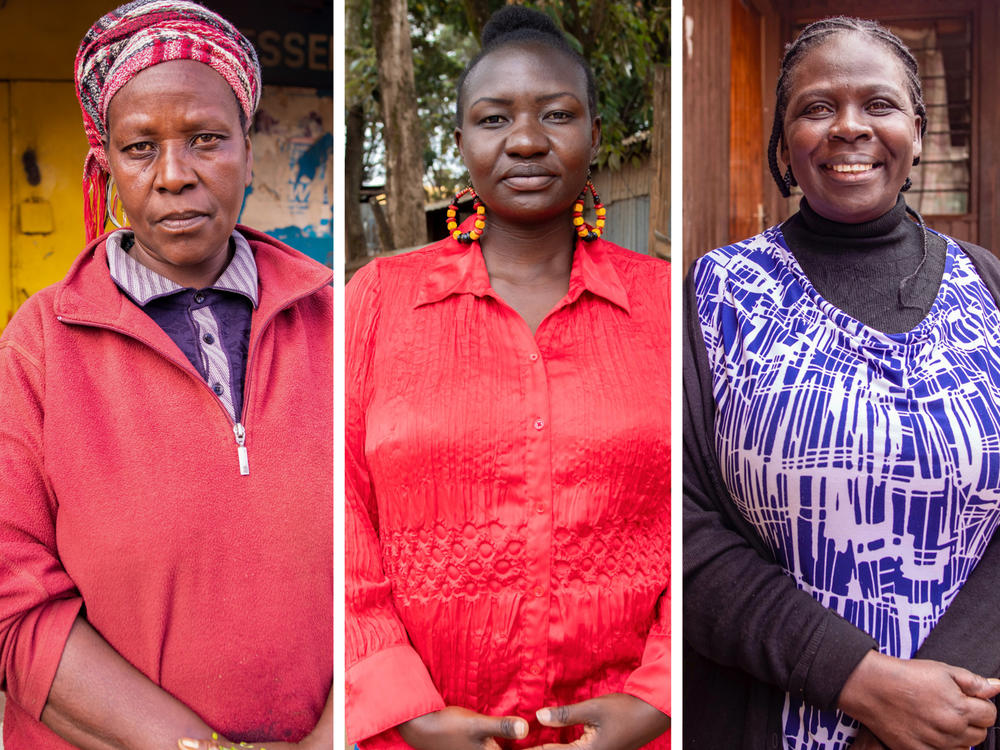Section Branding
Header Content
Resilient and strong: Voices of women from Kenya's largest 'slum'
Primary Content
It's the day after International Women's Day. On March 8 each year, the United Nations declares a special day to pay tribute to the accomplishments of women, to express how much they are valued and to press for gender equality.
In the wake of the celebrations and demonstrations held on this day, life goes on for women around the world. We interviewed women in Kibera, the Nairobi neighborhood that locals refer to as the largest "slum" in Kenya, to get a glimpse of their routines, their challenges, their sources of joy and strength. Their lives are a reminder of the challenges women face — and how they persevere.
Stellah Kamene: 'I have been able to manage day-to-day activities of raising my 6-year-old son alone'
Stellah Kamene, a 28-year-old single mother, is feeling good because of the U.N. day that just passed. She took it as a moment to "celebrate" herself.
"Why do I say so? Because I have been able to manage day-to-day activities of raising my 6-year-old son alone as a single mum and being happy to see him grow each day.'' She earns a living by cleaning houses for well-off families.
Kamene's story is of dreams deferred but never dismissed. ''At 22 years old, while in my second year undertaking a bachelor's studies in business management in the university, I got pregnant by a man I truly loved. The news of my pregnancy made him abandon me and I never got to see him again. That still hurts me.''
''I did not abort my child as pushed by some of my close friends,'' adds Kamene. But she did end up dropping out of school.
A year after the baby's birth, in 2018, she tried to return to university but didn't have the money to pay the tuition of about $1,000.
But she has not given up hope. ''This is something in my mind. I wish to go back to school one day and complete my studies so I can stand for my son and show him that I made it and that he too can make it much higher than I did when it comes to education,'' says Kamene.
Everlyne Bowa: "I ... fill in gaps as a mentor"
Everlyne Bowa, 31, works as a mentor in Kibera. Part of her job is to identify young mothers – under age 18 – and give them a listening ear and encouragement to stay positive.
''I come in to fill in gaps as a mentor by speaking with girls who share personal stories from their underlying emotional abuse," she says. "The girls are not always ready to open up with their parents on matters to do with relationships." Her work has special meaning, she says, because a mentor "helped shape my life for who I am today."
Benta Agolla: 'My HIV status does not define me'
Benta Agolla is a 50-year-old mother of 6 and a teacher. ''I am HIV positive," she says. She has been on medication for 20 years and now works as an HIV peer educator for women in Kibera and other settlements in Nairobi.
"My HIV status does not define me," she says. "I am defined by my womanhood, my survival, my strength and my hope for a better tomorrow. [That] is what keeps me going each passing day. I don't have to live in fear because I am HIV positive and on medication. I have to be an example that, yes, we have a second chance to life.''
Reflecting on her family, she adds, "I need to be healthy and alive because my children still need me. I am their pillar of hope."
Botul Kassim Issa: 'Men and women ... are all equally able'
Botul Kassim Issa, a 36-year-old mother of two, works as a master of ceremony – in Kenya that means hosting public events, introducing speakers and so on.
She says she has to work twice as hard as a man would to land jobs as a master of ceremony. Thinking of International Women's Day, she says,
"As we remember the milestones women have been able to achieve across the world, let it also be a moment to reflect [on] ways men and women can be placed on the same playing ground because we are all equally able."
Elizabeth Vihenda: 'My strength comes from within me'
Elizabeth Vihenda, age 50 and the mother of five, supports her family by running a vegetable stand in the Kibera marketplace.
She says she's not as strong as she was 20 years ago but she knows she must persist. ''As we continue to experience the tough economic hard times, as a woman l am expected to never give up," says Vihenda. ''My strength comes within me and is rooted in the rich soils of Kibera. I am a woman of strength, and we are the ones who run the world right from our households. I will continue to do what I can to push forward each day."
"I may stumble and fall," she says. But setbacks will not stop her from facing each new day with a determination "to rise again."
Thomas Bwire is an award-winning journalist who frequently writes about life in Kibera. He frequently contributes to NPR.

